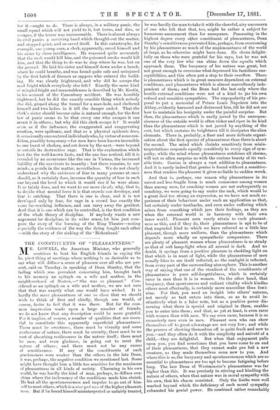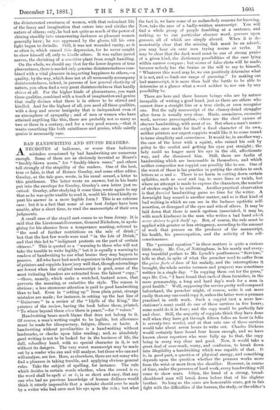THE CONSTITUENTS OF "PLEASANTNESS."
MR. LOWELL, the American Minister, who generally contrives to beat his English friends in saying the ha.,piest thing at meetings where nothing is so desirable as to say what will diffuse a sense of pleasure over all who are pre- sent, said on Tuesday, in speaking of Dean Stanley, that the feeling which was prevalent concerning him, brought back to his memory an epitaph on a wife and mother, in the neighbourhood of Boston,—" She was so pleasant." Con- sidered as an epitaph on a wife and mother, we are not sure that that was exactly what one would have wished. It is hardly the mere pleasantness of one so close that we should wish to think of first and chiefly, though one would, of course, desire to feel that it was there. But for the com- mon impression made upon a large number of friends, we do not know that any description could be more grateful. For it implies, of course, a number of qualities that are essen- tial to constitute this apparently superficial pleasantness. There must be sweetness, there must be vivacity and some exuberance of nature, there must be serenity, there must be no root of absorbing restlessness in the nature itself ; there must be ease, and even gladness, in going out to meet the nature of others ; and there must not be any excess of sensitiveness. If any of the constituents of such graciousness were weaker than the others in the late Dean, it was, perhaps, the negative condition we mentioned last. Some might have thought him a little too sensitive for the maximum of pleasantness in all kinds of society. Charming in his own world, he was hardly the kind of man, perhaps, to diffuse sun- shine where the inclemency of the conditions made him shrink. He had all the spontaneousness and impulse to go out of him- self to meet others, which is a sine quei non of the higher pleasant- ness. But if he found himself misinterpreted or unfairly treated,
he was hardly the man to take it with the cheerful, airy unconcern of one who felt that that, too, might be rather a subject for humorous amusement than for annoyance. Possessing in the highest degree every other constituent of pleasantness, Dean Stanley's sensitiveness prevented him, perhaps, from overcoming by his pleasantness as much of the unpleasantness of the world at large, as he otherwise might have done. He shone delight- fully on those who were grateful for his rays, but he was not one of the very few who can shine down the squalls which approach them. The buoyancy of his nature was great, but not great enough to overcome what depressed his fastidious sus- ceptibilities, and this often put a stop to their overflow. There is pleasantness which is in great measure dependent on external conditions, and pleasantness which is almost marvellously inde- pendent of them; and the Dean had the last only where the hostile external conditions were not of a kind to jar his own refined and sensitive sympathies. The unpopularity of his pro- posal to put a memorial of Prince Louis Napoleon into the Abbey, evidently harassed and distressed him, till he did not see how to maintain his benignity under the painful surprise. But then, the pleasantness which is easily jarred by the unrespon- siveness of the outside world is often richer and riper in its kind than the pleasantness which is not jarred by anything of the sort, but which sustains its brightness till it dissipates the alien elements. There is, probably, a finer and more delicate organi- sation about the first species of pleasantness than there is about the second. The mind which shrinks sensitively from misin- terpretations responds equally sensitively to every sign of sym- pathy, while the mind whose pleasantness outshines all storms, will not so often surprise us with the curious beauty of its vari- able tints. Genius is always a vast addition to pleasantness. And it is rarely indeed that genius is found without a sensitive- ness that renders the pleasure it gives us liable to sudden wreck.
And that is, perhaps, one reason why pleasantness in its surest and less fragile form is much commoner among women than among men, for sunshiny women are not unfrequently as sunshiny, we were going to say under the rack, which would be a great deal too strong an expression, as we have not much ex- perience of their behaviour under such an application as that, but certainly under toothache, and even under suffering which arises from something which jars their feelings, as they are when the external world is in harmony with their own inner world. Pleasant men rarely attain to such pleasant- ness as this, and if they do, their pleasantness is apt to be of that ungraded kind to which we have referred as a little leas pleasant, though more uniform, than the pleasantness which depends more wholly on sympathetic companions. There are plenty of pleasant women whose pleasantness is as steady as that of soft lamp-light when all around is dark. And no doubt, it springs from a positive pleasure in shedding light on that which is in want of light, while the pleasantness of men usually likes to see itself reflected, as the sunlight is reflected, from every part of the surrounding atmosphere. This is another way of saying that one of the steadiest of the constituents of pleasantness is pure self-forgetfulness, which is certainly rarer in men than it is in women. On the other hand, that buoyancy, that spontaneous and radiant vitality which kindles others most effectually, is certainly more masculine than femi- nine. For that, you need an insight into others' natures, not merely as tact enters into them, so as to avoid in- stinctively what is a false note, but as a positive power dis- cerning what there is special and original in them, enables you to enter into them ; and that, as yet at least, is even rarer with women than with men. We say even rarer, because it is so excessively rare even in men. Pleasant men who can show themselves off to great advantage are not very few ; and while the process of showing themselves off is quite fresh and new to you.—and they often do it with the simplicity and naiveté of a child,—they are delightful. But when that enjoyment palls upon you, you find sometimes that you have come to an end of their pleasantness, that they cannot make you feel a new creature, as they made themselves seem new to you. And where this is so, the buoyancy and spontaneousness which are so essential to pleasantness are too apt to become fatiguing before long. The late Dean of Westminster's pleasantness was far higher than this. It was precisely in stirring and kindling the nature of others, when that nature was in moral sympathy with his own, that his charm consisted. Only the limits were well marked beyond which the deficiency of such moral sympathy exhausted his genial power. He combined rather remarkably the disinterested sweetness of women, with that redundant life of the fancy and imagination that enters into and vivifies the nature of others; only, he had not quite as much of the power of shining steadily into unanswering darkness as pleasant women generally have ; he was oppressed by the gloom, till his own light began to dwindle. Still, it was not wounded vanity, as it so often is, which caused this depression, for he never sought to show himself off, only to kindle others. It was rather jarred nerves, the shrinking of a sensitive plant from rough handling.
On the whole, we should say that for the lower degrees of true pleasantness, there is needed only genuine disinterestedness com- bined with a vital pleasure in imparting happiness to others,—a quality, by the way, which does not at all necessarily accompany disinterestedness, indeed, in persons of low general elasticity of nature, you often find a very great disinterestedness that hardly shines at all. For the higher kinds of pleasantness, you want these qualities, combined with a touch of imagination and genius that really divines what there is in others to be stirred and kindled. And for the highest of all, you need all these qualities, with a deep and serene benignity that is independent even of an atmosphere of sympathy ; and of men or women who have attained anything like this, there are probably not so many as two or three in a century, and for a very good reason,—that it wants something like both saintliness and genius, while saintly genius is necessarily rare.











































 Previous page
Previous page